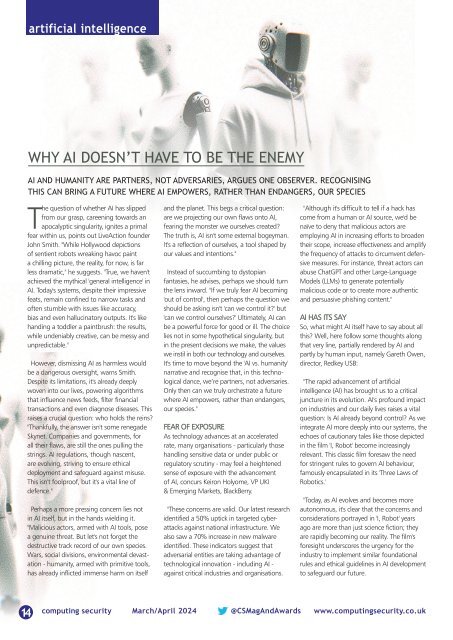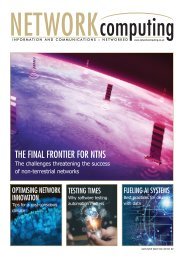CS Mar-Apr 2024
Create successful ePaper yourself
Turn your PDF publications into a flip-book with our unique Google optimized e-Paper software.
artificial intelligence<br />
WHY AI DOESN’T HAVE TO BE THE ENEMY<br />
AI AND HUMANITY ARE PARTNERS, NOT ADVERSARIES, ARGUES ONE OBSERVER. RECOGNISING<br />
THIS CAN BRING A FUTURE WHERE AI EMPOWERS, RATHER THAN ENDANGERS, OUR SPECIES<br />
The question of whether AI has slipped<br />
from our grasp, careening towards an<br />
apocalyptic singularity, ignites a primal<br />
fear within us, points out LiveAction founder<br />
John Smith. "While Hollywood depictions<br />
of sentient robots wreaking havoc paint<br />
a chilling picture, the reality, for now, is far<br />
less dramatic," he suggests. "True, we haven't<br />
achieved the mythical 'general intelligence' in<br />
AI. Today's systems, despite their impressive<br />
feats, remain confined to narrow tasks and<br />
often stumble with issues like accuracy,<br />
bias and even hallucinatory outputs. It's like<br />
handing a toddler a paintbrush: the results,<br />
while undeniably creative, can be messy and<br />
unpredictable."<br />
However, dismissing AI as harmless would<br />
be a dangerous oversight, warns Smith.<br />
Despite its limitations, it's already deeply<br />
woven into our lives, powering algorithms<br />
that influence news feeds, filter financial<br />
transactions and even diagnose diseases. This<br />
raises a crucial question: who holds the reins?<br />
"Thankfully, the answer isn't some renegade<br />
Skynet. Companies and governments, for<br />
all their flaws, are still the ones pulling the<br />
strings. AI regulations, though nascent,<br />
are evolving, striving to ensure ethical<br />
deployment and safeguard against misuse.<br />
This isn't foolproof, but it's a vital line of<br />
defence."<br />
Perhaps a more pressing concern lies not<br />
in AI itself, but in the hands wielding it.<br />
"Malicious actors, armed with AI tools, pose<br />
a genuine threat. But let's not forget the<br />
destructive track record of our own species.<br />
Wars, social divisions, environmental devastation<br />
- humanity, armed with primitive tools,<br />
has already inflicted immense harm on itself<br />
and the planet. This begs a critical question:<br />
are we projecting our own flaws onto AI,<br />
fearing the monster we ourselves created?<br />
The truth is, AI isn't some external bogeyman.<br />
It's a reflection of ourselves, a tool shaped by<br />
our values and intentions."<br />
Instead of succumbing to dystopian<br />
fantasies, he advises, perhaps we should turn<br />
the lens inward. "If we truly fear AI becoming<br />
'out of control', then perhaps the question we<br />
should be asking isn't 'can we control it?' but<br />
'can we control ourselves?' Ultimately, AI can<br />
be a powerful force for good or ill. The choice<br />
lies not in some hypothetical singularity, but<br />
in the present decisions we make, the values<br />
we instil in both our technology and ourselves.<br />
It's time to move beyond the 'AI vs. humanity'<br />
narrative and recognise that, in this technological<br />
dance, we’re partners, not adversaries.<br />
Only then can we truly orchestrate a future<br />
where AI empowers, rather than endangers,<br />
our species."<br />
FEAR OF EXPOSURE<br />
As technology advances at an accelerated<br />
rate, many organisations - particularly those<br />
handling sensitive data or under public or<br />
regulatory scrutiny - may feel a heightened<br />
sense of exposure with the advancement<br />
of AI, concurs Keiron Holyome, VP UKI<br />
& Emerging <strong>Mar</strong>kets, BlackBerry.<br />
"These concerns are valid. Our latest research<br />
identified a 50% uptick in targeted cyberattacks<br />
against national infrastructure. We<br />
also saw a 70% increase in new malware<br />
identified. These indicators suggest that<br />
adversarial entities are taking advantage of<br />
technological innovation - including AI -<br />
against critical industries and organisations.<br />
"Although it's difficult to tell if a hack has<br />
come from a human or AI source, we'd be<br />
naïve to deny that malicious actors are<br />
employing AI in increasing efforts to broaden<br />
their scope, increase effectiveness and amplify<br />
the frequency of attacks to circumvent defensive<br />
measures. For instance, threat actors can<br />
abuse ChatGPT and other Large-Language<br />
Models (LLMs) to generate potentially<br />
malicious code or to create more authentic<br />
and persuasive phishing content."<br />
AI HAS ITS SAY<br />
So, what might AI itself have to say about all<br />
this? Well, here follow some thoughts along<br />
that very line, partially rendered by AI and<br />
partly by human input, namely Gareth Owen,<br />
director, Redkey USB:<br />
"The rapid advancement of artificial<br />
intelligence (AI) has brought us to a critical<br />
juncture in its evolution. AI's profound impact<br />
on industries and our daily lives raises a vital<br />
question: Is AI already beyond control? As we<br />
integrate AI more deeply into our systems, the<br />
echoes of cautionary tales like those depicted<br />
in the film 'I, Robot' become increasingly<br />
relevant. This classic film foresaw the need<br />
for stringent rules to govern AI behaviour,<br />
famously encapsulated in its 'Three Laws of<br />
Robotics.'<br />
"Today, as AI evolves and becomes more<br />
autonomous, it's clear that the concerns and<br />
considerations portrayed in 'I, Robot' years<br />
ago are more than just science fiction; they<br />
are rapidly becoming our reality. The film's<br />
foresight underscores the urgency for the<br />
industry to implement similar foundational<br />
rules and ethical guidelines in AI development<br />
to safeguard our future.<br />
14<br />
computing security <strong>Mar</strong>ch/<strong>Apr</strong>il <strong>2024</strong> @<strong>CS</strong>MagAndAwards www.computingsecurity.co.uk
















